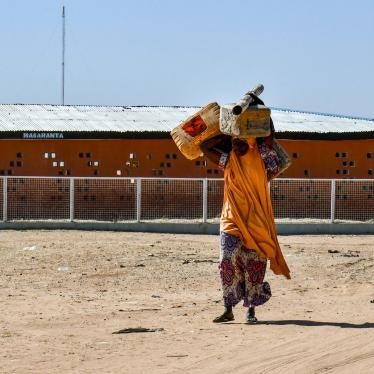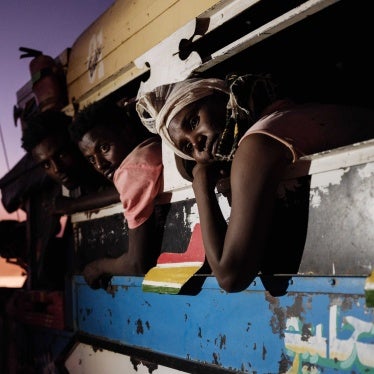Sir John Holmes
Under-Secretary-General for Humanitarian Affairs and Emergency Relief Coordinator
United Nations Office for the Coordination of Humanitarian Affairs
New York, New York
Goma, February 6, 2009
Dear Sir,
On behalf of the Congo Advocacy Coalition, a group of 100 aid and human rights organizations, we urge you to insist to the parties to the conflict in North and South Kivu in the Democratic Republic of Congo that the protection of civilians during military operations be a top priority, and for the UN peacekeeping mission in Congo (MONUC) to have a central role in the planning of all military operations, as mandated by the UN Security Council, in order to effectively protect civilians and ensure humanitarian access.
Even before the main thrust of military action has begun, the joint operations have already sparked significant displacement in North and South Kivu. While estimates of numbers remain tentative, people have fled in response to warnings of imminent combat, actual outbreaks of fighting, and just plain fear, adding to the 1.2 million already displaced in earlier waves of fighting. This includes 4,500 refugees who fled to Uganda, and more who have fled from their homes in Lubero and Masisi territories in North Kivu. Some of those displaced have since returned, but the situation remains volatile and further displacement is expected.
Villagers have reported FDLR reprisal killings and rape of civilians in the Katoyi area of Masisi territory, and there are also reports that civilians are being blocked from fleeing in some areas in western Masisi, effectively being used as human shields. In eastern Rutshuru territory, Congolese and Rwandan coalition forces, as well as other armed groups, are reportedly responsible for rape and pillaging over the past two weeks.
It is crucial that the Rwandan and Congolese armies, together with MONUC, take steps immediately to ensure that civilians are protected throughout the military operations, by rigorously applying international humanitarian law, limiting further displacement, promoting humanitarian access and systematically mitigating against known threats to civilians and non-combatants. We hope that you will use your trip to eastern Congo this week, and follow-up meetings in New York, to ensure that MONUC and other relevant actors have the resources needed to protect civilians effectively.
Lessons must be learned from the unimaginable brutality suffered by Congolese civilians in northeastern Congo following the launch of a joint Ugandan and Congolese military operation to disarm the Lord's Resistance Army (LRA), a Ugandan rebel group that has been based in Congo's Garamba National Park since 2005. More than 700 people were massacred by the LRA in less than one month during a series of coordinated, simultaneous attacks over the Christmas period last year. In each place, protection measures were reactive and Congolese soldiers arrived, if at all, at least a day or more after horrific, organized killing raids. Over 130,000 civilians have been forced from their homes in Haut Uélé district, and the attacks continue.
The FDLR has a hauntingly similar history of avoiding military confrontation and instead launching devastating reprisal attacks on civilians. It is clear that further human rights abuses against civilians in North and South Kivu in particular remain a real threat.
We fear that if the following urgent steps are not taken immediately by the parties to the conflict, MONUC and other internal actors, there could, once again, be disastrous consequences for the people of eastern DRC:
- The Rwanda-DRC command center for the joint military operation should ensure that protection of civilians is a critical component of impending operations and adequate measures are taken to distinguish between combatants and non-combatants and to prevent civilian casualties. The two governments should immediately present their plans for ensuring civilian protection and agree with MONUC on any additional safeguards required and how these are to be implemented.
- MONUC should continue its deployment of joint protection teams, comprising human rights, child protection, civil affairs and demobilization specialists near military contingents of all parties to the conflict, including field bases close to where the FDLR are located, and should extend such deployments to other areas as required. MONUC command should ensure that guidance on practical implementation of the protection mandate is fully understood and adhered to by all members of the mission. UN member states should urgently deploy the additional peacekeepers and equipment authorized in November 2008 to assist in protecting civilians.
- A special adviser on human rights for eastern Congo should be appointed to help ensure that respect for human rights and protection of civilians is a critical component of military operations and the political process.
- The parties to the conflict should ensure that humanitarian access is kept open so that life-saving assistance can be delivered to all in need. To promote that, a senior civilian official should be appointed to liaise between humanitarian actors and military contingents in the joint operation to allow the sharing of information necessary for humanitarian planning.
- DDRRR bases should be situated close to FDLR locations to help ensure that anyone wanting to surrender is able to do so in safety, security and dignity. As military operations continue against the FDLR leadership, efforts by the two governments and MONUC to encourage voluntary repatriation of FDLR combatants and their dependants should be strengthened and properly resourced, not sidelined.
The continued presence of the FDLR in eastern Congo reflects the underlying problems contributing to the persistent violence. FDLR combatants need to be disarmed and demobilized and those responsible for serious violations of international law, including genocide, must be held to account. But dealing with the FDLR problem does not tackle the other issues that have contributed to conflict in eastern Congo such as land tenure, representation of minorities, the culture of impunity, and the illegal exploitation of Congo's mineral wealth. Military operations will not resolve these matters and there will not be lasting peace unless there is a political process to find solutions to such issues.
We therefore also urge you, and the UN Secretariat and Security Council, to encourage all parties to the conflict to abide by their previous commitments under the Nairobi and Goma Accords and re-engage in a political process to tackle the underlying issues that feed conflict in eastern Congo and bring about a lasting peace that the people of eastern Congo so desperately seek.
Yours sincerely,
The Congo Advocacy Coalition
The Congo Advocacy Coalition, made up of local and international nongovernmental organizations, was established in July 2008 to advocate for greater protection of civilians and respect for human rights in eastern Congo. Members of the coalition's steering committee include: ActionAid, ENOUGH Project, Human Rights Watch, Mercy Corps, Norwegian Refugee Council (NRC), Oxfam, Conseil Régional des Organisations Non Gouvernementales de Développement (CRONGD) - North Kivu, Promotion et Appui aux Initiatives Féminines (PAIF) - North Kivu, Institut Congolaise pour la Justice et la Paix (ICJP) - South Kivu, and Association des Femmes Juristes du Congo (AFEJUCO) - South Kivu.
Other Signatories:
International NGOs:
Action Against Hunger/ Action Contre la Faim (ACF) - USA, American Bar Association (ABA) Rule of Law Initiative in DRC, Beati i costruttori di pace/ Blessed are the Peacemakers , CAFOD, CARE International, Centre Lokole/ Search for Common Ground, Global Witness, International Emergency and Development Aid (IEDA) Relief, Jesuit Refugee Service (JRS) Great Lakes, Refugees International, Tearfund, Trocaire, War Child Holland
Congolese NGOs:
ACAEFAD, Action by Christians Against Torture (ACAT)/Sud Kivu, ACPS, Action des Chrétiens Activistes des Droits de l'Homme a Shabunda (ACADHOSHA), ADECOF/Sud Kivu, AFCD, AFCDI, AFECEF, AJERF, Africa Justice Peace and Development (AJPD), ALCM, AMALDEFEA, AMI-KIVU, ANAMEDAPED, APIBA, APRODEPED, ASADHO (Association africaine de défense des droits de l'homme) - Sud Kivu, ASALAK, Action Sociale pour la Paix et le Développement (ASPD), Association pour le Développement des Initiatives Paysannes (ASSODIP), AYINET/DRC, BDENA, Blessed Aid, CADRE, Collectif des Associations des Femmes Pour le Développement (CAFED), Campagne Pour la Paix (CPP), CCJT, CEDAC, CELPA/SK, Centre d'Appui pour le Développement Rural Communautaire (CADERCO), Centre de Recherche sur l'Environnement, la Démocratie et les Droits de l'Homme (CREDDHO), Centre de promotion socio-sanitaire (CEPROSSAN), Centre d'Etudes et de Recherche en Education de Base pour le Développement Integré (CEREBA), Coalition RDC pour la Cour Pénale Internationale (CPI), Collectif des Organisations des Jeunes Solidaires du Congo (COJESKI)/Sud Kivu, Collectif des Organisations des Jeunes Solidaires du Congo (COJESKI)/ Nord Kivu, COPARE, CUBAKA, DYJESKI, EFD, Encadrement des femmes indigènes et des ménages vulnérables (EFIM), Entraide des Femmes pour les Déshérités (EFD) - Uvira Sud -Kivu, Foyer Social de Mogo (FSM/Kabare), GAIDER, GAMAC, GRAM-Kivu, Group d'Etudes et d'Actions Pour un Développement Bien Défini (GEAD) /Nord-Kivu, Groupe de Voix de Sans Voix (GVSV), Groupe Féminine, HEAL Africa, Héritiers de la Justice, Humanitas, IGE/CCD, La Synergie des femmes pour les victimes des violences sexuelles (SFVS), Mamans Umoja, Martin Luther King Non-Violence Group, OCET, PAL, PAMI, Perspectives "Monde Juste", PIDP-Kivu, PRENAO, PRODES, Promotion de la Démocratie et Protection des Droits Humains (PDH), RADHOSKI-Sud Kivu, Réseau Provincial des ONG de Droits de l'Homme (REPRODHOC)/Nord-Kivu, RFDP, SAMS, SARCAF, SILDE, SJPR/EST, Solidarité pour la Promotion Sociale et la Paix (SOPROP), SYNECAT, UCODE, UPADERI, VOVOLIB (Voix de Sans Voix ni Libertés)






